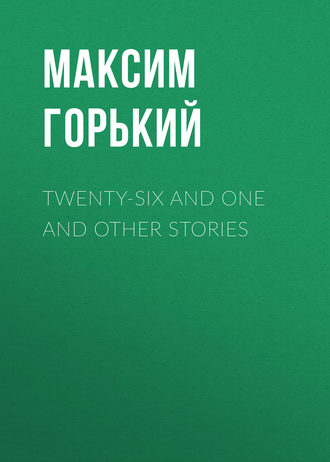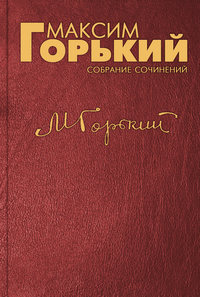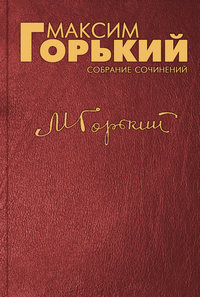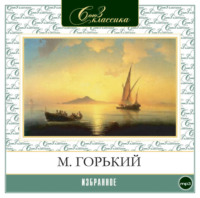 полная версия
полная версияTwenty-six and One and Other Stories
About a month went by. The soldier baked white bread, walked around with the embroidery girls, came quite often to our workshop, but never told us of his success with the girls; he only twisted his moustache and licked his lips with relish.
Tanya came every morning for the biscuits and, as always, was cheerful, amiable, kind to us. We attempted to start a conversation with her about the soldier, but she called him a "goggle-eyed calf," and other funny names, and this calmed us. We were proud of our little girl, seeing that the embroidery girls were making love to the soldier. Tanya's relation toward him somehow uplifted all of us, and we, as if guided by her relation, began to regard the soldier with contempt. And we began to love Tanya still more, and, meet her in the morning more cheerfully and kind-heartedly.
But one day the soldier came to us a little intoxicated, seated himself and began to laugh, and when we asked him what he was laughing at he explained: "Two had a fight on account of me… Lidka and Grushka… How they disfigured each other! Ha, ha! One grabbed the other by the hair, and knocked her to the ground in the hallway, and sat on her… Ha, ha, ha! They scratched each other's faces… It is laughable! And why cannot women fight honestly? Why do they scratch? Eh?"
He sat on the bench, strong and clean and jovial; talking and laughing all the time. We were silent. Somehow or other he seemed repulsive to us this time.
"How lucky I am with women, Eh? It is very funny! Just a wink and I have them!"
His white hands, covered with glossy hair, were lifted and thrown back to his knees with a loud noise. And he stared at us with such a pleasantly surprised look, as though he really could not understand why he was so lucky in his affairs with women. His stout, red face was radiant with happiness and self-satisfaction, and he kept on licking his lips with relish.
Our baker scraped the shovel firmly and angrily against the hearth of the oven and suddenly said, sarcastically:
"You need no great strength to fell little fir-trees, but try to throw down a pine.".
"That is, do you refer to me?" asked the soldier.
"To you.."
"What is it?"
"Nothing… Too late!"
"No, wait! What's the matter? Which pine?"
Our baker did not reply, quickly working with his shovel at the oven. He would throw into the oven the biscuits from the boiling kettle, would take out the ready ones and throw them noisily to the floor, to the boys who put them on bast strings. It looked as though he had forgotten all about the soldier and his conversation with him. But suddenly the soldier became very restless. He rose to his feet and walking up to the oven, risked striking his chest against the handle of the shovel, which was convulsively trembling in the air.
"No, you tell me – who is she? You have insulted me… I?.. Not a single one can wrench herself from me, never! And you say to me such offensive words.".. And, indeed, he looked really offended. Evidently there was nothing for which he might respect himself, except for his ability to lead women astray; it may be that aside from this ability there was no life in him, and only this ability permitted him to feel himself a living man.
There are people to whom the best and dearest thing in life is some kind of a disease of either the body or the soul. They make much of it during all their lives and live by it only; suffering from it, they are nourished by it, they always complain of it to others and thus attract the attention of their neighbors. By this they gain people's compassion for themselves, and aside from this they have nothing. Take away this disease from them, cure them, and they are rendered most unfortunate, because they thus lose their sole means of living, they then become empty. Sometimes a man's life is so poor that he is involuntarily compelled to prize his defect and live by it. It may frankly be said that people are often depraved out of mere weariness. The soldier felt insulted, and besetting our baker, roared:
"Tell me – who is it?"
"Shall I tell you?" the baker suddenly turned to him.
"Well?"
"Do you know Tanya?"
"Well?"
"Well, try.".
"I?"
"You!"
"Her? That's easy enough!"
"We'll see!"
"You'll see! Ha, ha!"
"She'll.."
"A month's time!"
"What a boaster you are, soldier!"
"Two weeks! I'll show you! Who is it? Tanya! Tfoo!".
"Get away, I say."
"Get away… you're bragging!"
"Two weeks, that's all!"
Suddenly our baker became enraged, and he raised the shovel against the soldier. The soldier stepped back, surprised, kept silent for awhile, and, saying ominously, in a low voice: "Very well, then!" he left us.
During the dispute we were all silent, interested in the result. But when the soldier went out, a loud, animated talk and noise was started among us.
Some one cried to the baker:
"You contrived a bad thing, Pavel!"
"Work!" replied the baker, enraged.
We felt that the soldier was touched to the quick and that a danger was threatening Tanya. We felt this, and at the same time we were seized with a burning, pleasant curiosity – what will happen? Will she resist the soldier? And almost all of us cried out with confidence:
"Tanya? She will resist! You cannot take her with bare hands!"
We were very desirous of testing the strength of our godling; we persistently proved to one another that our godling was a strong godling, and that Tanya would come out the victor in this combat. Then, finally, it appeared to us that we did not provoke the soldier enough, that he might forget about the dispute, and that we ought to irritate his self-love the more. Since that day we began to live a particular, intensely nervous life – a life we had never lived before. We argued with one another all day long, as if we had grown wiser. We spoke more and better. It seemed to us that we were playing a game with the devil, with Tanya as the stake on our side. And when we had learned from the bulochniks that the soldier began to court "our Tanya," we felt so dreadfully good and were so absorbed in our curiosity that we did not even notice that the proprietor, availing himself of our excitement, added to our work fourteen poods (a pood is a weight of forty Russian pounds) of dough a day. We did not even get tired of working. Tanya's name did not leave our lips all day long. And each morning we expected her with especial impatience. Sometimes we imagined that she might come to us – and that she would be no longer the same Tanya, but another one.
However, we told her nothing about the dispute. We asked her no questions and treated her as kindly as before. But something new and foreign to our former feelings for Tanya crept in stealthily into our relation toward her, and this new something was keen curiosity, sharp and cold like a steel knife.
"Fellows! Time is up to-day!" said the baker one morning, commencing to work.
We knew this well without his calling our attention to it, but we gave a start, nevertheless.
"Watch her!.. She'll come soon!" suggested the baker. Some one exclaimed regretfully: "What can we see?"
And again a lively, noisy dispute ensued. To-day we were to learn at last how far pure and inaccessible to filth was the urn wherein we had placed all that was best in us. This morning we felt for the first time that we were really playing a big game, that this test of our godling's purity might destroy our idol. We had been told all these days that the soldier was following Tanya obstinately, but for some reason or other none of us asked how she treated him. And she kept on coming to us regularly every morning for biscuits and was the same as before. This day, too, we soon heard her voice:
"Little prisoners! I've come.."
We hastened to let her in, and when she entered we met her, against our habit, in silence. Staring at her fixedly, we did not know what to say to her, what to ask her; and as we stood before her we formed a dark, silent crowd. She was evidently surprised at our unusual reception, and suddenly we noticed that she turned pale, became restless, began to bustle about and asked in a choking voice:
"Why are you.. such?
"And you?" asked the baker sternly, without taking his eyes off the girl.
"What's the matter with me?"
"Nothing.."
"Well, quicker, give me biscuits.."
She had never before hurried us on..
"There's plenty of time!" said the baker, his eyes fixed, on her face.
Then she suddenly turned around and disappeared behind the door.
The baker took up his shovel and said calmly, turning towards the oven:
"It is done, it seems!.. The soldier!.. Rascal!.
Scoundrel!".
Like a herd of sheep, pushing one another, we walked back to the table, seated ourselves in silence and began to work slowly. Soon some one said:
"And perhaps not yet.".
"Go on! Talk about it!" cried the baker.
We all knew that he was a clever man, cleverer than any of us, and we understood by his words that he was firmly convinced of the soldier's victory… We were sad and uneasy. At twelve o'clock, during the dinner hour, the soldier came. He was, as usual, clean and smart, and, as usual, looked straight into our eyes. We felt awkward to look at him.
"Well, honorable gentlemen, if you wish, I can show you a soldier's boldness,".. said he, smiling proudly. "You go out into the hallway and look through the clefts… Understand?"
We went out and, falling on one another, we stuck to the cleft, in the wooden walls of the hallway, leading to the yard. We did not have to wait long… Soon Tanya passed with a quick pace, skipping over the plashes of melted snow and mud. Her face looked troubled. She disappeared behind the cellar door. Then the soldier went there slowly and whistling. His hands were thrust into his pockets, and his moustache was stirring.
A rain was falling, and we saw the drops fall into plashes, and the plashes were wrinkling under their blows. It was a damp, gray day – a very dreary day. The snow still lay on the roofs, while on the ground, here and there, were dark spots of mud. And the snow on the roofs, too, was covered with a brownish, muddy coating. The rain trickled slowly, producing a mournful sound. We felt cold and disagreeable.
The soldier came first out of the cellar; he crossed the yard slowly,
Stirring his moustache, his hands in his pockets – the same as always.
Then Tanya came out. Her eyes.. her eyes were radiant with joy and happiness, and her lips were smiling. And she walked as though in sleep, staggering, with uncertain steps. We could not stand this calmly. We all rushed toward the door, jumped out into the yard, and began to hiss and bawl at her angrily and wildly. On noticing us she trembled and stopped short as if petrified in the mud under her feet. We surrounded her and malignantly abused her in the most obscene language. We told her shameless things.
We did this not loud but slowly, seeing that she could not get away, that she was surrounded by us and we could mock her as much as we pleased. I don't know why, but we did not beat her. She stood among us, turning her head one way and another, listening to our abuses. And we kept on throwing at her more of the mire and poison of our words.
The color left her face. Her blue eyes, so happy a moment ago, opened wide, her breast breathed heavily and her lips were trembling.
And we, surrounding her, avenged ourselves upon her, for she had robbed us. She had belonged to us, we had spent on her all that was best in us, though that best was the crusts of beggars, but we were twenty-six, while she was one, and therefore there was no suffering painful enough to punish her for her crime! How we abused her! She was silent, looked at us wild-eyed, and trembling in every limb. We were laughing, roaring, growling. Some more people ran up to us. Some one of us pulled Tanya by the sleeve of her waist..
Suddenly her eyes began to flash; slowly she lifted her hands to her head, and, adjusting her hair, said loudly, but calmly, looking straight into our eyes:
"Miserable prisoners!"
And she came directly toward us, she walked, too, as though we were not in front of her, as though we were not in her way. Therefore none of us were in her way, and coming out of our circle, without turning to us, she said aloud, and with indescribable contempt:
"Rascals!.. Rabble!".
Then she went away.
We remained standing in the centre of the yard, in the mud, under the rain and the gray, sunless sky..
Then we all went back silently to our damp, stony ditch. As before, the sun never peeped in through our windows, and Tanya never came there again!..
Tchelkache
The sky is clouded by the dark smoke rising from the harbor. The ardent sun gazes at the green sea through a thin veil. It is unable to see its reflection in the water so agitated is the latter by the oars, the steamer screws and the sharp keels of the Turkish feluccas, or sail boats, that plough the narrow harbor in every direction. The waves imprisoned by stone walls, crushed under the enormous weights that they carry, beat against the sides of the vessels and the quays; beat and murmur, foaming and muddy.
The noise of chains, the rolling of wagons laden with merchandise, the metallic groan of iron falling on the pavements, the creaking of windlasses, the whistling of steamboats, now in piercing shrieks, now in muffled roars, the cries of haulers, sailors and custom-house officers – all these diverse sounds blend in a single tone, that of work, and vibrate and linger in the air as though they feared to rise and disappear. And still the earth continues to give forth new sounds; heavy, rumbling, they set in motion everything about them, or, piercing, rend the hot and smoky air.
Stone, iron, wood, vessels and men, all, breathe forth a furious and passionate hymn to the god of Traffic. But the voices of the men, scarcely distinguishable, appear feeble and ridiculous, as do also the men, in the midst of all this tumult. Covered with grimy rags, bent under their burdens, they move through clouds of dust in the hot and noisy atmosphere, dwarfed to insignificance beside the colossal iron structures, mountains of merchandise, noisy wagons and all the other things that they have themselves created. Their own handiwork has reduced them to subjection and robbed them of their personality.
The giant vessels, at anchor, shriek, or sigh deeply, and in each sound there is, as it were, an ironical contempt for the men who crawl over their decks and fill their sides with the products of a slaved toil. The long files of 'longshoremen are painfully absurd; they carry huge loads of corn on their shoulders and deposit them in the iron holds of the vessels so that they may earn a few pounds of bread to put in their famished stomachs. The men, in rags, covered with perspiration, are stupefied by fatigue, noise and heat; the machines, shining, strong and impassive, made by the hands of these men, are not, however, moved by steam, but by the muscles and blood of their creators – cold and cruel irony!
The noise weighs down, the dust irritates nostrils and eyes; the heat burns the body, the fatigue, everything seems strained to its utmost tension, and ready to break forth in a resounding explosion that will clear the air and bring peace and quiet to the earth again – when the town, sea and sky will be calm and beneficent. But it is only an illusion, preserved by the untiring hope of man and his imperishable and illogical desire for liberty.
Twelve strokes of a bell, sonorous and measured, rang out. When the last one had died away upon the air, the rude tones of labor were already half softened. At the end of a minute, they were transformed into a dull murmur. Then, the voices of men and sea were more distinct. The dinner hour had come.
* * * * *When the longshoremen, leaving their work, were dispersed in noisy groups over the wharf, buying food from the open-air merchants, and settling themselves on the pavement, in shady corners, to eat, Grichka Tchelkache, an old jail-bird, appeared among them. He was game often hunted by the police, and the entire quay knew him for a hard drinker and a clever, daring thief. He was bare-headed and bare-footed, and wore a worn pair of velvet trousers and a percale blouse torn at the neck, showing his sharp and angular bones covered with brown skin. His touseled black hair, streaked with gray, and his sharp visage, resembling a bird of prey's, all rumpled, indicated that he had just awakened. From his moustache hung a straw, another clung to his unshaved cheek, while behind his ear was a fresh linden leaf. Tall, bony, a little bent, he walked slowly over the stones, and, turning his hooked nose from side to side, cast piercing glances about him, appearing to be seeking someone among the 'longshoremen. His long, thick, brown moustache trembled like a cat's, and his hands, behind his back, rubbed each other, pressing closely together their twisted and knotty fingers. Even here, among hundreds of his own kind, he attracted attention by his resemblance to a sparrow-hawk of the steppes, by his rapacious leanness, his easy stride, outwardly calm but alert and watchful as the flight of the bird that he recalled.
When he reached a group of tatterdemalions, seated in the shade of some baskets of charcoal, a broad-shouldered and stupid looking boy rose to meet him. His face was streaked with red and his neck was scratched; he bore the traces of a recent fight. He walked along beside Tchelkache, and said under his breath:
"The custom-house officers can't find two boxes of goods. They are looking for them. You understand, Grichka?"
"What of it?" asked Tchelkache, measuring him calmly with his eyes.
"What of it? They are looking, that's all."
"Have they inquired for me to help them in their search?"
Tchelkache gazed at the warehouses with a meaning smile.
"Go to the devil!"
The other turned on his heel.
"Hey! Wait! – Who has fixed you up in that fashion? Your face is all bruised – Have you seen Michka around here?"
"I haven't seen him for a long time!" cried the other, rejoining the 'longshoremen.
Tchelkache continued on his way, greeted in a friendly manner by all. But he, usually so ready with merry word or biting jest, was evidently out of sorts to-day, and answered all questions briefly.
Behind a bale of merchandise appeared a custom-house officer, standing in his dark-green, dusty uniform with military erectness. He barred Tchelkache's way, placing himself before him in an offensive attitude, his left hand on his sword, and reached out his right hand to take Tchelkache by the collar.
"Stop, where are you going?"
Tchelkache fell back a step, looked at the officer and smiled drily.
The red, cunning and good-natured face of the custom-house officer was making an effort to appear terrible; with the result that swollen and purple, with wrinkling eyebrows and bulging eyes, it only succeeded in being funny.
"You've been warned before: don't you dare to come upon the wharf, or
I'll break every rib in your body!" fiercely exclaimed the officer.
"How do you do, Semenitch! I haven't seen you for a long time," quietly replied Tchelkache, extending his hand.
"I could get along without ever seeing you! Go about your business!"
However, Semenitch shook the hand that was extended to him.
"You're just the one I want to see," pursued Tchelkache, without loosening the hold of his hooked fingers on Semenitch's hand, and shaking it familiarly. "Have you seen Michka?"
"What Michka? I don't know any Michka! Get along with you, friend, or the inspector'll see you; he – "
"The red-haired fellow who used to work with me on board the
'Kostroma,'" continued Tchelkache, unmoved.
"Who stole with you would be nearer the truth! Your Michka has been sent to the hospital: his leg was crushed under a bar of iron. Go on, friend, take my advice or else I shall have to beat you."
"Ah! – And you were saying: I don't know Michka! You see that you do know him. What's put you out, Semenitch?"
"Enough, Grichka, say no more and off with you – "
The officer was getting angry and, darting apprehensive glances on either side, tried to free his hand from the firm grasp of Tchelkache. The last named looked at him calmly from under his heavy eyebrows, while a slight smile curved his lips, and without releasing his hold of the officer's hand, continued talking.
"Don't hurry me. When I'm through talking to you I'll go. Tell me how you're getting on. Are your wife and children well?"
Accompanying his words with a terrible glance, and showing his teeth in a mocking grin, he added:
"I'm always intending to make you a visit, but I never have the time:
I'm always drunk – "
"That'll do, that'll do, drop that – Stop joking, bony devil! If you don't, comrade, I – Or do you really intend to rob houses and streets?"
"Why? There's enough here for both of us. My God, yes! – Semenitch! You've stolen two boxes of goods again? – Look out, Semenitch, be careful! Or you'll be caught one of these days!"
Semenitch trembled with anger at the impudence of Tchelkache; he spat upon the ground in a vain effort to speak. Tchelkache let go his hand and turned back quietly and deliberately at the entrance to the wharf. The officer, swearing like a trooper, followed him.
Tchelkache had recovered his spirits; he whistled softly between his teeth, and, thrusting his hands in his trousers' pockets, walked slowly, like a man who has nothing to do, throwing to the right and left scathing remarks and jests. He received replies in kind.
"Happy Grichka, what good care the authorities take of him!" cried someone in a group of 'longshoremen who had eaten their dinner and were lying, stretched out on the ground.
"I have no shoes; Semenitch is afraid that I may hurt my feet," replied
Tchelkache.
They reached the gate. Two soldiers searched Tchelkache and pushed him gently aside.
"Don't let him come back again!" cried Semenitch, who had remained inside.
Tchelkache crossed the road and seated himself on a stepping-block in front of the inn door. From the wharf emerged an interminable stream of loaded wagons. From the opposite direction arrived empty wagons at full speed, the drivers jolting up and down on the seats. The quay emitted a rumbling as of thunder; accompanied by an acrid dust. The ground seemed to shake.
Accustomed to this mad turmoil, stimulated by his scene with Semenitch, Tchelkache felt at peace with all the world. The future promised him substantial gain without great outlay of energy or skill on his part. He was sure that neither the one nor the other would fail him; screwing up his eyes, he thought of the next day's merry-making when, his work accomplished, he should have a roll of bills in his pocket. Then his thoughts reverted to his friend Michka, who would have been of so much use to him that night, if he had not broken his leg. Tchelkache swore inwardly at the thought that for want of Michka he might perhaps fail in his enterprise. What was the night going to be? – He questioned the sky and inspected the street.
Six steps away, was a boy squatting in the road near the sidewalk, his back against a post; he was dressed in blue blouse and trousers, tan shoes, and a russet cap. Near him lay a little bag and a scythe, without a handle, wrapped in hay carefully bound with string. The boy was broad shouldered and fairhaired with a sun-burned and tanned face; his eyes were large and blue and gazed at Tchelkache confidingly and pleasantly.
Tchelkache showed his teeth, stuck out his tongue, and, making a horrible grimace, stared at him persistently.
The boy, surprised, winked, then suddenly burst out laughing and cried:
"O! how funny he is!"
Almost without rising from the ground, he rolled heavily along toward Tchelkache, dragging his bag in the dust and striking the stones with his scythe.
"Eh! say, friend, you've been on a good spree!" said he to Tchelkache, pulling his trousers.
"Just so, little one, just so!" frankly replied Tchelkache. This robust and artless lad pleased him from the first.
"Have you come from the hay-harvest?"
"Yes. I've mowed a verst and earned a kopek! Business is bad! There are so many hands! The starving folks have come – have spoiled the prices. They used to give sixty kopeks at Koubagne. As much as that! And formerly, they say, three, four, even five rubles."









